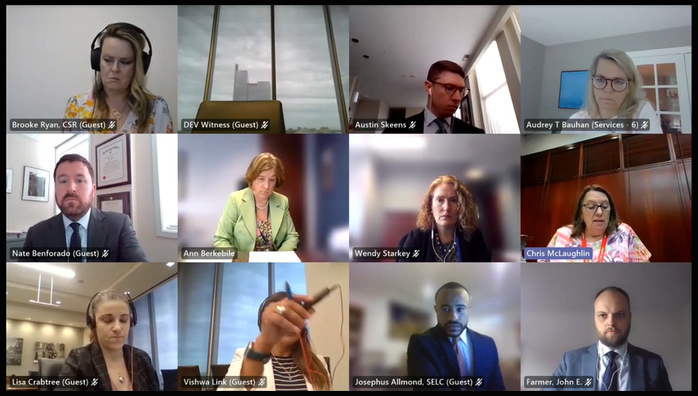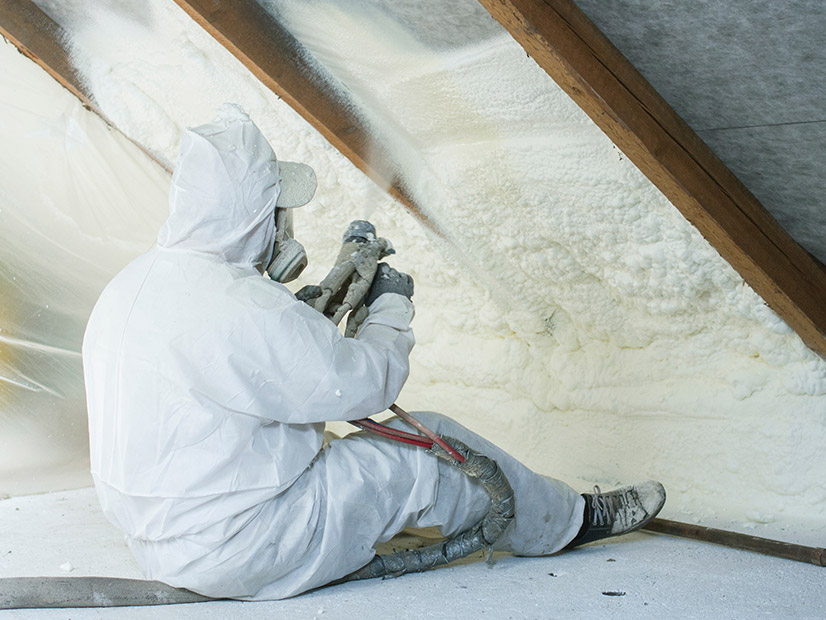Dominion Energy (NYSE:D) found itself on the defensive Tuesday in a Virginia State Corporation Commission (SCC) hearing on its proposed update to its demand side management (DSM) programs — even though there was no opposition in principle to what the company says it wants to accomplish.
The programs are intended to meet the Virginia Clean Economy Act of 2020’s (VCEA) requirement that the company produce energy savings of 1.25% of its load in 2022, rising to 2.5% in 2023, and 5% in 2025. But the company acknowledged before the hearing that its existing programs and the 11 additional programs in the Phase IX proposal it made in December would only produce savings of 3% or less by 2025 (PUR-2020-00274).
“It appears with this filing that Dominion is officially slow-walking its deployment of energy efficiency resources in the commonwealth,” said Walton Shepherd, Virginia policy director for the Natural Resources Defense Council’s Climate & Clean Energy Program, calling the proposed $162 million in spending too small. “According to the company’s filing, less than four out of 100 Dominion customers were served last year by Dominion DSM programs.”
He criticized budget caps on the programs, which he acknowledged, in response to a query from a Dominion attorney, were imposed by the SCC. The agency must lift those caps, he said, while for Dominion’s part, “better marketing could better tap the full available potential.”
Nate Benforado, senior attorney with the Southern Environmental Law Center, representing intervenor Appalachian Voices, said that “we still have serious concerns” that Dominion has not met its responsibilities. “The company has continued to proceed in a piecemeal fashion,” he said. “We would like to see programs and budgets, and for the company to explain how they will meet these responsibilities.” The idea isn’t to push the company into developing a rigid plan, he added; instead, the plan should be changeable depending on future developments.

Nathan Frost, director of new technology and energy conservation for Dominion, agreed with Appalachian Voices consultant Jim Grevatt that there will be a significant savings shortfall beginning in 2023.
According to Frost, “the company currently projects that it will meet the VCEA savings target in 2022, but that more needs to be done for 2023 to meet the General Assembly’s targets, at least under the ‘net’ savings scenario.” The estimates the company has provided include both net and gross energy savings, he said, because state law does not say which is the appropriate standard.
Frost further testified that the company “is committed to doing everything practicable to achieve the applicable public policy goals in consultations with a full range of stakeholders,” and that “no party or staff opposes at least initial approval of the company’s programmatic requests in this proceeding.”
That last point appeared to be something of a refrain, with Dominion attorney Lisa Crabtree of McGuireWoods LLP saying that “there are few issues actually in contest” as to the company’s proposed programs.
“We’re really looking at probably the last opportunity the company has to change course to have a fair chance at meeting the requirements to comply with the savings targets established by the law,” Grevatt testified. He said Frost’s assurances were “not very specific. He says, `We’re committed; we’re going to work with stakeholders.’ He sort of says `we’re going to figure this out’ but doesn’t say how that’s going to occur.”
The new energy efficiency (EE) and demand response programs Dominion is proposing include: in-home energy assessments and installation of energy-saving measures for customers who meet age and income qualifications; incentives to residential customers for the installation of “smart communicating” water heating and pool pump technologies; incentives to purchase smart thermostats and other smart home technologies; an online, self-directed home energy assessment and incentives for installing solar panels. Other programs would offer incentives to farmers and businesses.
SCC attorney Austin Skeens said that “based on staff’s limited review,” Dominion’s projections seem reasonable.
But Andrew T. Boehnlein, a senior utilities analyst in the commission’s Division of Public Utility Regulation, said staff believes the design of the proposed low income and age qualifying (IAQ) program “inflates the program’s costs and minimizes the benefits for low-income, elderly and disabled participants,” noting the company estimated average customer savings of 67 kWh annually, or $7.39.
“Staff is concerned that the proposed Phase IX IAQ program, as well as prior iterations of low-income programs, exhibit a pattern of systemic bias that effectively denies access to participation in energy efficiency programs to large swaths of the company’s low-income, elderly and disabled customers,” Boehnlein said in written testimony. “Staff believes a new approach is needed to augment the effectiveness of the company’s current vendor-based program in order to expand access to these under-served customers and to increase the overall level of energy savings achieved.”
Staff also recommended that solar installations “be warrantied to shield low-income, elderly and disabled customers from incurring future costs due to these installations.”



